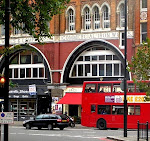I agree with Mount, but would add that political debates are poorer if they are limited to Politics with a capital P. In other words, politicians tend to be more humane and more efficient when they engage in the world outside of the so-called corridors of power, when they engage in the minutiae of the lives of their constituents. This is one reason why after a long time in power many politicians lose touch with the needs of the people. And that's no good for anyone, a point emphasised by Catherine (in Terence Rattigan's Winslow Boy, just revived in a powerful, timely production starring Timothy West and directed by Stephen Unwin). It deals with fact-based case of a teenager, Ronnie Winslow, wrongly accused of stealing a postal order: 'If ever the time comes that the House of Commons has so much on its mind that it can't find time to discuss a Ronnie Winslow and his bally postal order, this country will be a far poorer place than it is now.'
The reverse is also true. There is no such thing as a divide between the political and the non political. Everything has a political dimension, art is not better merely because it tries to bang on about a political point, but any form of art shifts the feelings of the reader, viewer or listener and affects, sometimes in a minute way (the bad band heard at the local club) and sometimes in a huge way (Picassso's Guernica, Ibsen's Doll's House), her or his interaction with the world.


